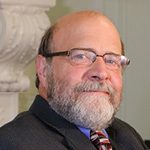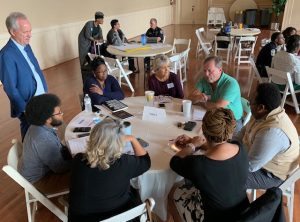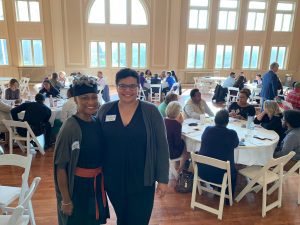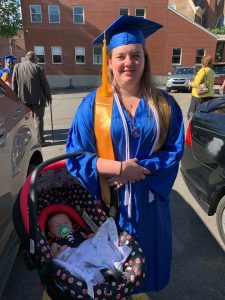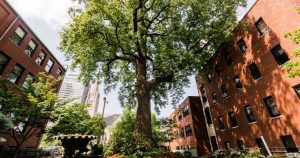With Commencement approaching on June 1, Spalding is publishing a series of stories and Q&A’s that highlight students from a range of degree programs who are set to graduate. Next up is Cristi Embry, who is receiving the degree of bachelor of arts in psychology.
That Cristi Embry is now the first member of her family to graduate college is a memorable achievement. The fact that she’s achieved it as a 39-year-old mother of four adds even more to the accomplishment.
But most remarkably, she also overcame a brain tumor in order to earn the right to walk across the stage at Spalding’s Commencement on Saturday.
That walk will be a proud moment for a woman who achieved a lifelong goal by fighting through the pain caused by the noncancerous tumor as well as the effects it had on her ability to concentrate and study.
“I was strong, and I persevered,” said Embry, who is graduating cum laude.
Three years ago – during her second year at Spalding – Embry went to see a doctor after suffering from increasingly severe headaches and sudden problems with depth perception and her balance and coordination. She thought she might have a inner-ear infection.
The tumor was discovered. She was transported immediately in an ambulance to another hospital for surgery the next day.
“I thought, ‘Oh my gosh, I can’t die. Who’s going to take care of my kids?'” Embry recalled.
Embry underwent 10 hours of surgery to remove the tumor, which was found to be the size of the surgeon’s fist. She then had a second surgery a month later to insert a shunt to help the movement of fluid in her brain. Soon after that she had a third surgery to treat an infection that developed after the first operation.
Last August, Embry’s tumor began to grow back more aggressively than was anticipated, requiring her to undergo six weeks of radiation treatments to counter the growth. (It hasn’t grown any more since then.)
The tumor, which will always remain at some size and is now being monitored, still causes her pain and discomfort, with the headaches and vision problems persisting. Going to four-hour classes and spending extensive time at home on the computer were physically taxing.
Though there were times, including this school year, when she thought about permanently stopping her studies at Spalding, she enjoyed her time as a student and her interactions with faculty too much to not finish.
“I looked forward to school,” Embry said. “It was a hobby. It was an escape. It was a distraction. I love learning. I love sitting in class with adults, with professors, and just loved the experience, so it was worth it to me.”
Through it all, she missed only one six-week session, and she completed her psychology degree in January.
Recently, she went by herself to the registrar’s office to collect her diploma.
“That was a special day I’ll never forget,” she said. “It was a celebration. It wasn’t about anybody but me. I cried, but nobody saw me. It was incredible. It was just like, ‘This is the most beautiful piece of paper.’”
She now has the diploma hanging next to her desk at home, and she looks at it every time she walks by.
Embry started at Spalding five years ago, fulfilling a desire she’d had her entire adult life to continue her education. She quit high school when she became pregnant with her first child.
She later completed her general education diploma and worked multiple jobs, including in an accounting office of a direct-mail company and in the office of an attorney. She also went through training to become a certified nursing assistant, but that never felt like a career she wanted. What she wanted was to attend college.
“I always loved school,” she said. “I love learning. I like to read and have always been really curious, and I just love knowing stuff. I just felt like there was something bigger out there and that I needed school to get where I wanted to go.”
She heard about Spalding about a decade ago from a classmate in that CNA training program and kept it in mind. She finally enrolled as a Flex student majoring in psychology and began taking two evening courses a week.
She said she found Spalding’s faculty and staff, including her adviser, Cindy Green, to be extremely supportive, and Embry loved the dialogue and critical thinking that her classes generated. After her tumor diagnosis, Embry said she felt especially fortunate to be taking psychology courses and to be taught by psychologists, because her interactions felt like a type of therapy. She had courses that examined sickness, suffering, death and spirituality, and she reflected on her own experiences.
“All the psychology professors are just, wow,” Embry said. ” … It feels so good to be in their presence. … The coursework was a healing process in itself. I never would have thought about those things or written about the tumor, ever, on my own. Being in that setting, you’re forced to look at things critically in that way.”
Though she’s finished with school, Embry still enjoys driving through or stopping by campus.
“I love it here,” she said. “It doesn’t feel like a business. It feels like friends and family. And it’s something of my own. I’m a mom, I’m a wife; that’s who I am. But this (when I’m at Spalding) is mine. It’s my time. These are my people, and I just feel good here.”
Embry continued: “Yes, the diploma is important, and, yes, finishing is important. But really it is just a journey and it improves your whole life and the way you look at the world and the way you look at people and the way you look at yourself. I don’t know another way that I would get that without Spalding.”
Embry said she plans to attend graduate school, and she’d like to become a counselor at a community agency, perhaps one serving young mothers.
Here’s more from Cristi Embry …
What is your favorite Spalding memory?
What comes to mind is Dr. Kathleen Nesbitt and my very first class was her writing class. She did a competition where we watched a news clip and had to write down all the scary or nervous words we could think of, and I won. I really like her, really respect her. I think she helped build my confidence. So I’d say my favorite memory was that very first night of class. She asked are there any new students to Spalding and are there any brand-new students to college? I raised my hand, and there were several other people. I was like, (sigh of relief). I’m going to be OK.
Which accomplishment are you most proud of from your time at Spalding?
Not quitting. Not giving up, even when I wanted to, even when I think it would have been totally justifiable and excusable.
What’s your favorite spot on campus?
The Mansion is my favorite building. A lot of my favorite classes have been there, so I just have a lot of good memories there and have learned a lot from a lot of smart people.
At Spalding, we like to say that, “Today is a great day to change the world.” For many of our students, Commencement is a world-changing experience. After graduation, how do you plan to change the world, big or small, and who inspires you to be a #spaldingworldchanger?
A lot of professors have inspired me to change the world, and if I really like a professor, I’m going to let them know and let them know what they’ve done for me. Every professor I’ve done that to, they’re like, ‘It’s nothing I did. It’s you.’ I’ve thought about that and taken that, and everybody can change the world. Attitudes are contagious, and being nice and friendly and smiling, it does something for people. I do that. Being kind, that it is a way to change the world. All day, every day, when you come in contact with people, just be kind.
